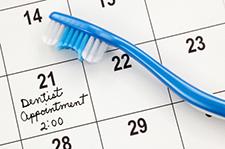
Theesan Vedan studied at the University of The Western Cape in January 2013. He has since taken up a position as a Military Dentist for the South African Defence.
Theesan is dedicated in pursuing a career in dental education and has a keen interest in writing, be it dental related or not. This article discusses methods to curb 'no-shows'.
Missed dental appointments plague the profession. With proper appointment policies, reminders and patient motivation- it is an issue that can be effectively controlled. This article discusses methods to curb 'no-shows'.
This article starts off as an outright rant. People who do not have a legitimate reason for nonattendance and did not call in advance (no-shows) to cancel their appointment are inconsiderate. The problem plagued me in dental school, so much so that I had to work an extra few weeks during one of my vacations to make sure my patient load was on track. It continues to trouble dental students and dentists worldwide. I'm not so sure whether it bothers my salaried government sector colleagues though, it just seems to ease their burden and schedule (much to their relief).
A practice that is clear and practical needs to be adopted with regards to 'no-shows'.
How can you minimise no-shows?
- One should, firstly strive to create a cancellation policy and simply informing the patients of it, will lead to fewer cancellations. If you would like them to call at least 24 hours in advance, then inform them. Display signs in your surgery. Ask your receptionists to verbally inform the patient whilst booking their appointment, as not everybody might have seen your notice.
- One should confirm appointments at least 48 hours beforehand. Confirmation calls are the best method of endorsing appointments as it tends to stick in the patients mind. Inform the patient that a confirmation call will be made and ask them as to what time would be convenient for them. People cannot always take calls at work and might view an unscheduled call as a nuisance. I also automated text messages- 'Send text at a later date and time'- this allowed me to schedule texts to all booked patients in advance. This function can be done though SMS gateways (online) or through the use of high end smart phone. A text reminder would often result in the patient inputting a reminder on the phone with the date and time of the appointment. Postcards are a nice touch and people tend to appreciate the gesture. Be wary of delays in ordinary mail though. Emails are also a helpful tool. Be sure to gain the patients permission to email them, especially if they will also be added to a mailing list
- Fill in cancellations quickly. If a patient cancels in advance, the spot should be filled quickly so it is not forgotten about. Computer systems help with completing this. Calls should be made to patients who can possibly make the cancellation time.
- Patients need to 'buy in' to your treatment plan. It is important to gain motivation from patients by continual education, informing them of the needs of treatment and answering any of their concerns. Whenever one asks a patient a question, always ask open-ended questions and praise improvements in oral hygiene. When patients recognise the need for the proposed dental treatment, then they will more readily present for your appointments.
If the patient has a genuine reason for not pitching up to an appointment and has a genuine reason to have not called (example a death in the family) or some understandably urgent matter, it would be unwise to bill such a patient for a 'missed appointment'. Emergencies sometimes don't present themselves 24 hours in advance. In situations of emergencies, people may, also, have other urgent problems to attend to that may surpass the need to call their dentist and reschedule their appointment.
Be aware of the forgetfulness of older patients. I like to schedule my older patients later in the afternoon- as it gives me time to make a second call to them to confirm their appointment, shields them from traffic and allows them to rearrange their itinerary- if they have forgotten their appointment. Always be emphatic, and recognise that circumstances are sometimes beyond control. Implementing these techniques would certainly ease the burden of no shows, resulting in increased productivity leading to a healthier, happier practice.
Theesan Vedan
[email protected]
Dental Protection is the leading indemnity provider.
Find out more